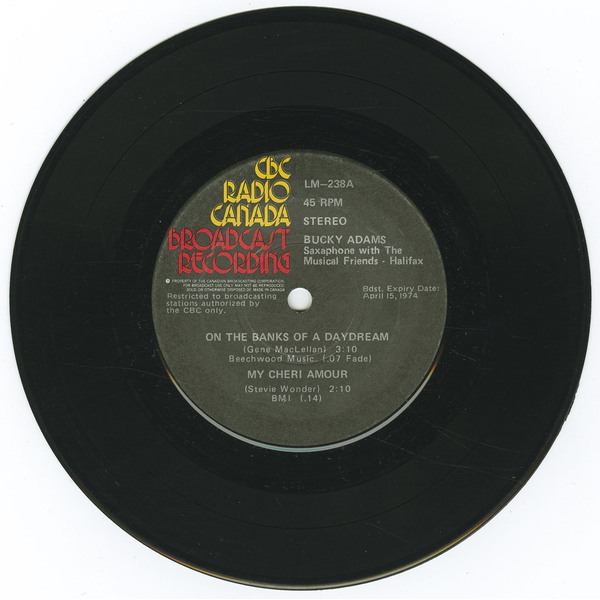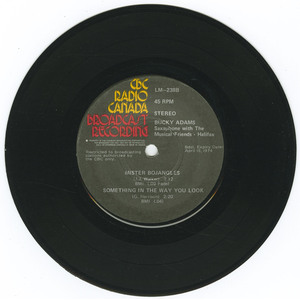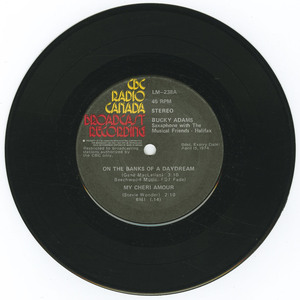Information/Write-up
(Charles Richmond Adams, April 25, 1937 – July 13, 2012)
Charles “Bucky” Richmond Adams stands as one of the most important and enduring figures in Nova Scotia’s Black music history. Born April 25, 1937, in Halifax into a large, deeply musical family, Adams grew up amid the cultural richness of Halifax’s North End — a historically Black community shaped by resilience, creativity, and systemic barriers. His early exposure to gospel, blues, and jazz came directly from his family, who fostered a love of music that would define his life.
Adams' first major public performance came at age nine, when he was hired to play trumpet for a Barnum & Bailey circus parade on the Halifax Commons — performing atop a lion cage after a last-minute substitution when one of the circus musicians collapsed. Even in childhood, Adams displayed both prodigious talent and a fearless ability to step onto any stage.
In his teens, Bucky initially focused on trumpet, but one fateful evening during a performance, he literally blew his horn apart. On break, he rushed home, borrowed his father’s saxophone, and never looked back. The tenor sax would become his voice for the next six decades.
In the 1950s and early 1960s, Adams established himself as a bandleader and innovator in the Maritime music scene, fronting a number of important groups including The Rockin’ Rebels, The Roadrunners, The Ambassadors, and Club Unusual. These early groups broke ground in an era where integrated bands were rare, especially in Nova Scotia. Adams was among the first Black Canadian musicians to cross racial barriers, sharing stages with white players and audiences at a time when segregation was still a quiet reality.
His skill and versatility on the saxophone brought him opportunities to perform with some of the greatest names in jazz history. Adams shared stages with Louis Armstrong, Count Basie, Dizzy Gillespie, Oscar Peterson, Lionel Hampton, and B.B. King — experiences that both validated his immense talent and expanded his musical vocabulary. He became known for his warm tone, commanding stage presence, and deep emotional expressiveness, equally comfortable in blues, gospel, swing, or modern jazz contexts.
In 1975, Bucky formed Basin Street, a group that would define one of the most prolific periods of his career. The ensemble became the house band at Privateers Warehouse, a venue in Halifax’s revitalized waterfront district. In 1976, they recorded Bucky Adams and Basin Street at Privateers’ Warehouse at Solar Audio in Dartmouth — a studio album that captured the group’s dynamic blend of classic and contemporary jazz, including originals like "Bucky's Blues" alongside soulful instrumentals such as a funk-infused version of "Ain’t No Sunshine." While the album suggested a live recording by title, it was recorded in studio and sold primarily at their residency performances.
Throughout his career, Adams faced the persistent undercurrents of racism that challenged many Black musicians in Atlantic Canada. In a 1980s interview, he reflected on these struggles with characteristic humility: “The way I look at it, they crucified the Lord; I can't complain.” Rather than retreat, Adams turned increasingly toward community-based projects that supported younger musicians and fostered cultural pride.
In 1981, Adams was featured on CBC Radio Halifax’s Identities, a powerful program profiling Black Canadian voices. His segment earned the International Gabriel Award, presented by the United Nations for excellence in broadcasting and cultural representation — one of the highest honors of his career.
The 1990s saw a new wave of creative energy for Adams. He became a featured soloist with the acclaimed Nova Scotia Mass Choir, blending gospel and jazz in moving performances that reached diverse audiences. In 1996, he self-released the album In A Lovin’ Way, a heartfelt collection featuring deeply personal songs like “Africville Shuffle” and “Maynard Street” — tributes to the vibrant, now-dismantled Black community of Africville and the North End neighborhood where Adams grew up. His next release, Live at the Thirsty Duck, recorded in Halifax, featured a live collaboration with his son Corey Adams, adding a generational depth to the Adams family legacy.
Adams continued to mentor young musicians well into the 2000s, forming connections with a new generation of performers and educators in Halifax’s growing Black cultural renaissance. Late in life, Adams volunteered weekly at Halifax’s Northwood Centre seniors’ home, performing music therapy sessions he affectionately called his “Wednesday night healing ministry.” In 2007, he was presented with a Lifetime Achievement Award from the African Nova Scotian Music Association (ANSMA), recognizing his pivotal role in preserving and advancing Black music in Nova Scotia.
Bucky Adams passed away on July 13, 2012, at the age of 75, leaving behind a profound musical and cultural legacy. In 2016, the East Coast Music Awards honored his memory by renaming their African Canadian Recording of the Year category as The Bucky Adams Memorial Award — a fitting tribute to a man who had given so much to Halifax’s Black music community.
Over a remarkable six-decade career, Bucky Adams embodied both the struggle and the joy of being a Black artist in Canada — an icon whose influence continues to resonate across generations.
-Robert Williston



No Comments